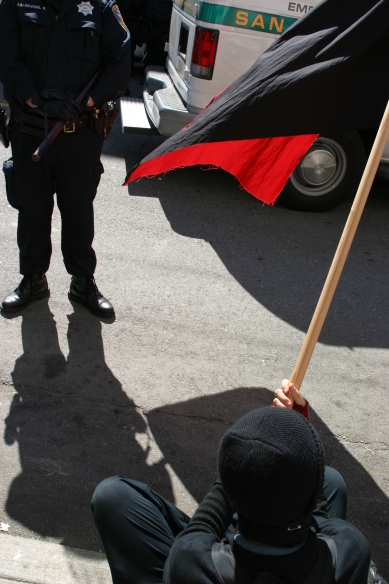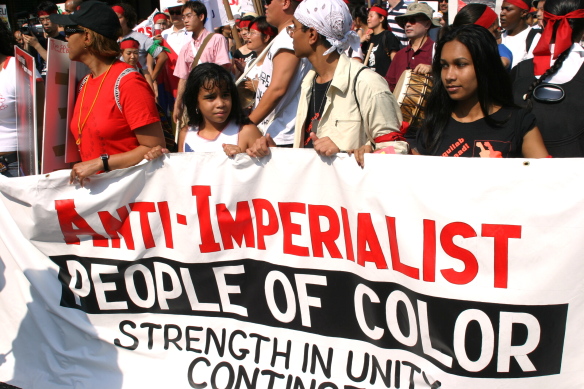Daniel Burton, a.k.a. Melchizedek, Lord of the Brambles
Anarcho-capitalism is a type of individualist anarchism, but most people who are Anarcho-capitalists don't identify primarily with individualist anarchism, and most people who explicitly identify themselves as individualist anarchists consider themselves class war anarchists, or anti-capitalists. There are some inbetweens too...
But the principal difference between anarcho-capitalism and individualist anarchism is that anarcho-capitalists typically come from a philosophical background that values capitalism primarily as a value in and of itself, while individualist anarchists have a more egalitarian view of individualism, with no such allegiance to capitalism, and much less faith that the free markets will serve the social good on its own without some kind of limitation or constraints.
One of the key differences is that individualist anarchists have traditionally opposed the unlimited ownership of land, especially absentee ownership, for the purpose of passively collecting rent. In the 19th Century, the main idea was some kind of squatter sovereignty, in which individuals only had a right to land while they were using it. Any unused land was free for someone else to claim. That made a lot of sense in the frontier-type situation of 19th Century America. Today, there is a lot more complex and innovative though to deal with space constraints and environmental issues. People like Fred Foldvary have ideas on this like everybody paying a land rent, divided among the rest of the community, and people paying an extraction fee for the use of natural resources.
I personally see problems with both ideas, and think the focus should be more on the kind of process and social institutions to achieve these goals than the final outcome or set of rights itself. I would like to see land use decisions made more flexibly, in a way that responds to peoples' needs, by some sort of informal bargaining process between all the various parties, not by any set system of voting, but not by any set system of property ownership or individual use rights either, something like the kind of anarchistic communalism that social anarchists want more generally -- something like a bunch of sovereign monarchs negotiating for a peace treaty basically, more like this than a parliament or a bunch of property owners taking each other to court.
Another difference, historically, has been attitudes towards intellectual property. Many individualist anarchists have opposed anything like copyrights or patents, not only based on principles of freedom of speech, but also for economic reasons. Like social anarchists, they see patents and copyrights as a limitation on the rights of the poor and working class to be self-sufficient and to build alternative economic systems, autonomous in and of themselves. They see access to not only land, but also technology, as being crucial to these goals. This is also crucial as an international issue. Europe, it its development took technological ideas from many other parts of the World without compensation, and would not have been able to get to where it is today without doing so -- so why should we now demand that Third World countries live up to a standard that Europeans themselves never had to?
Perhaps not a substantive difference in ultimate goals, but a difference in emphasis and strategies is individualist anarchists' view of the importance of ending the government money monopoly and regulations on banking. In a world where nobody had to pay taxes in the government's currency and there was no legal tender, individualist anarchists think that those who are presently without significant financial resources could improve their lot by joining mutual banks and issuing private, alternative currencies. They could thus gain a medium of exchange to do business with each other, without having to borrow from or pay interest to a passive class of wealthy individuals. Some, like mutualist anarchists, see the possibility of the working class issuing currency backed by their homes, cars, etc., just as banks back their deposits by loans to homeowners, for cars, etc. now. Others imagine currency backed by the power labor itself, by promises to work if it is redeemed, etc. In any case, all, including anarcho-capitalists see interest rates going down far lower and money becoming more readily available without a free market for currency.
Anarcho-capitalists, however, do not typically place such high importance on alternative currencies or share individualist anarchists' concern for the good of the poor and working class, so in reality, this leads to a difference in present strategies. Some anarcho-capitalists fight endlessly for tax cuts that would mostly benefit the rich without ever thinking of how alternative currencies could help the poor. Individualist anarchists, who consider themselves part of the left, would never seek such things first, when the poor are so much more in need of individual rights that could improve their lives.
Some individualist anarchists would go even farther. Benjamin Tucker, a 19th Century individualist anarchist, and perhaps the most famous individualist anarchist of all, at one point, thought that not only ownership of land, but also all rent, business profits, and interest were wrong, and their victims should never be compelled to pay any of these, unless it was their choosing. He even thought that workers, renters, and lendees, who had once voluntarily agreed to respect these capitalist institutions, should later be able to go back and seek compensation for the wrongs done to them.
Today, with more developed economic theory, this doesn't seem to make so much sense -- if you prohibit all rent, profit, and interest, what will most likely happen is nobody will rent, lend, or make capital investments, and the poor will simply not be able to obtain housing, money, or physical capital to work with... But modern economic theory also postulates that capitalism doesn't always work perfectly on its own, and individualist anarchists who don't share a capitalist ideology, might use these ideas to try to formulate individualist responses to market failures. For example, monopolies that engage in price gouging are not particularly nice. We could have government protect us from this, but it is not likely to do a particularly good job, and the extra bureaucracy necessary to carry out this function can also be used to carry out functions of oppression. So what is the individualist response? Well, we could have individuals, and their chosen protection organizations, go to these monopolies and force them to recognize an individual right to buy products at a reasonable price... And these would more than likely be less bureaucratic and more efficient than government regulation. There are many reasons for this, not the least of which is competition in the market for enforcement.
There are some other things I would like to see recognized, like the need not just to allow use of natural resource in a more equitable way, but the need also to preserve them, especially things that are not so much commodities like intact ecosystems. There is a kind of market failure at work here too. You could on the one hand, say that if people want ecosystems preserved, they should pay for them. The problem is that this creates a moral hazard, rent seeking behavior, basically, a perverse incentive for people who would not normally have any interest in destroying the environment for their own purposes to threaten to do so just so they can collect some money to preserve it. You could assign the rights just the opposite way, and say everyone owns the environment, so you have to get permission from everyone before destroying anything. This would cause instead another kind of market failure, a hold-out problem. Anyone who wanted to make some kind of development with an environmental impact would start trying to pay off people to do so. The problem is some people would start pretending to be far more interested in the preservation of even minor, inconsequential environmental assets than they really were, just to get paid off, and the fewer people who were left, the more they would demand. The end result would be that you could never do anything because you couldn't pay everyone off.
The best kind of solution to this problem is something in between, where you can do some things that destroy the environment without anybody's permission, but you still have to pay people in the community (or even world at large) to compensate for the damage -- and they have to accept some set price without being able to stop you and hold out for more.
The best way to do this, I think, is not through some moral abstraction that says we all should respect this set of rights, and insist on that amount of payment, but a dynamic process of negotiation like I described earlier. Each individual who wants to live in a world whose ecosystems are preserved should negotiate would each individual who wants to do something withecological impact. Their respective strengths of conviction will form the balance that sets exactly what the price is, or in some cases, whether any price is enough. The fallback if negotiations fail will be direct action -- either the developer goes ahead and starts building, using force to defend this right if necessary, or the environmentalists undertake activity to stop him, using force if necessary. The incentive to stop negotiations from breaking down, and this happening, is that such conflicts are messy, and often mutually destructive and costly to both parties. Once people learn this, they should solve their disputes peacefully most of the time.
To work effectively, the environmentalists would probably have to group together into organizations that represent the interests of their members, but since this is an individualist solution I'm talking about, you can imagine that each individual would have the choice to join or not join many different organizations, and different environmental organizations that worked in parallel to enforce the individual rights to protect the ecosystem would compete with each other. Imagine a world where Earth First!, the Sierra Club, and the Wilderness society sit down at a bargaining table with a developer and 20 smaller environmental organizations, some representing coalition of yet smaller organizations, represent the interests of their members, and negotiate a resolution where the developer either agrees to pay everyone off to compensate for the environmental destruction, or leaves and abandons the projects, because he can't afford the price. Now that definitely isn't capitalism -- but it is individualist.
You can imagine that in an individualist anarchy, individual rights might supersede property rights in all sorts of other ways, without economic resources having to be collectivized -- and some of these like squatter's rights are definitively individual rights. There is a lot of innovation possible in thinking up various different ways of dealing with things, various different balances in a scheme of individual rights between property rights, equality, and environmentalism. Not a lot has been said about this is in recent years; a lot more needs to be said.





























